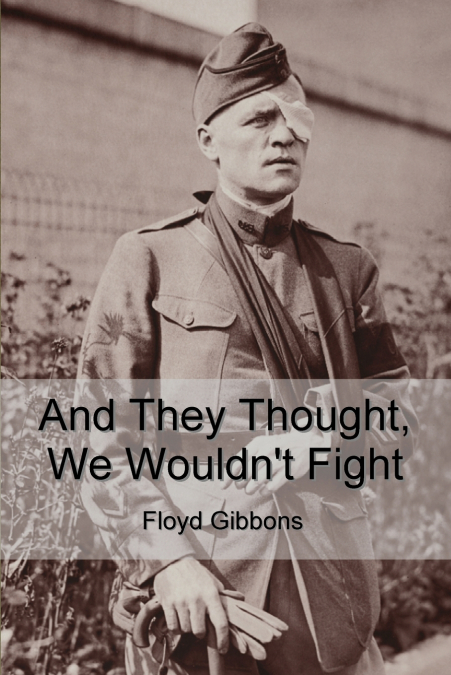
Floyd Gibbons
Gibbons’ book is based on his WWI dispatches for the Chicago Tribute and provides a first-hand account of the war from an embedded journalist (before that term even existed). We journey with him as his ship across the Atlantic is torpedoed, as he witnesses Pershing’s grand arrival in France, as the American troops are trained by the British and French, and as he descends into the hell of the trenches. More than just a narrative of the US entering WWI, this is a book that documents young America’s trial-by-fire as they emerge onto the worldwide stage in the 20th century, leaving behind their isolationist, pioneering early years and transforming into the global, industrial military power that is only now beginning to wane as their superpower status erodes roughly 100-years later. ... ( Mike) About the Author:Floyd Phillips Gibbons (July 16, 1887 - September 23, 1939) was the war correspondent for the Chicago Tribune during World War I. One of radio’s first news reporters and commentators, he was famous for a fast-talking delivery style. Floyd Gibbons lived a life of danger of which he often wrote and spoke.Gibbons began as a police reporter on the Minneapolis Daily News in 1907, but was fired. He also worked for the Milwaukee Free Press and the Minneapolis Tribune. While working for the Tribune in 1910, he was arrested for cutting a telegraph line in Winter, Wisconsin to prevent other newspapers from reporting a story first. He moved to the Chicago Tribune in 1912. He became well known for covering the Pancho Villa Expedition in 1916. He became a London correspondent for the Chicago Tribune in 1917 and reported on the 1917 torpedoing of the British ship RMS Laconia, on which he was a passenger.The Chicago Tribune appreciated his keen eye for detail, and vivid splashy style. It sent him to England to cover World War I. As a correspondent at the Battle of Belleau Wood, France. Gibbons accompanied the Fifth Marines where his account of the battle that he submitted violated wartime censorship by mentioning that he was serving with the U.S. Marine Corps. Gibbons’ colourful prose added to the reputation of the Marines. Gibbons lost an eye after being hit by German gunfire at Château-Thierry in June 1918 while attempting to rescue an American marine. Always afterwards he wore a distinctive white patch on his left eye. He was given France’s greatest honor, the Croix de Guerre with palm, for his valor on the field of battle.In 1918-1927 he was the chief of the Chicago Tribune’s foreign service, and director of the paper’s European office. He gained fame for his coverage of wars and famines in Poland, Russia and Morocco. He was fired in 1926, started to write novels, and became a radio commentator for NBC. He narrated newsreels, for which he received a star on the Hollywood Walk of Fame. He also narrated Vitaphone’s 'Your True Adventures' series of short films, which began as a radio program in which Gibbons paid twenty-five dollars for the best story submitted by a listener. In 1927 he wrote a biography of the Manfred von Richthofen (the Red Baron) titled The Red Knight of Germany. He also wrote the speculative fiction novel The Red Napoleon in 1929. Gibbons was the narrator for the documentary film With Byrd at the South Pole (1930). In 1929, he had his own half-hour radio program heard Wednesday nights on the NBC Red Network at 10:30. Competition from Paul Whiteman’s show on CBS Radio, however, brought Gibbons’ show to an end by March 1930.When Gibbons suggested that Frank Buck write about Buck’s animal collecting adventures, Buck collaborated with Edward Anthony on Bring ’Em Back Alive which became a bestseller in 1930. (Wikipedia.og)